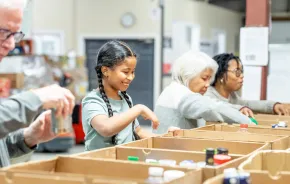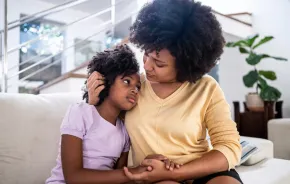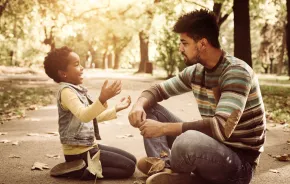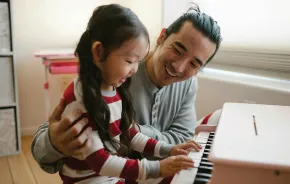
I have trouble sleeping. I can’t work as effectively. I’m preoccupied by worry about the world my children and grandchildren will inherit. I feel guilty about not doing more to limit my fossil fuel use, but I also feel guilty that my kids seem to be as upset as I am. I don’t know how much to validate their fears about the mass extinction of species which will happen over their lifetime, or protect them from despair. I’m mad at climate deniers and mad at myself for not doing more. I’m miserable.
I have been seeing an increase in the number of families expressing “climate anxiety” in my practice. It exists on a continuum of feelings of stress and sadness about climate change at one end to depression, hopelessness and helplessness at the other end.
In Finland, researchers have associated mental strain from “eco-anxiety” among children and adolescents with their limited ability to make an impact on this looming threat in their futures. Other vulnerable groups are those experiencing climate change effects directly right now — farmers, fishermen, hunters and indigenous peoples.
I witnessed this myself on a recent trip to Malawi. The yearly drought and flood disasters there make food insecurity and hunger among their most pressing national concerns. About half of the school children in Malawi get by on one meal a day. Malawian kids and their parents don’t have the luxury of thinking that climate change problems may or may not reach catastrophic proportions in the future. For them, climate disasters are happening now.
But lest you think that climate change effects happen elsewhere, think again. Dig (not so) deep into the science of American climate-related environmental crises. Look into the analyses of hurricanes and superstorms — Katrina in New Orleans, Sandy in New York City and Puerto Rico. Consider the recent Camp Fire in California. Peruse a 2009 Army Corps of Engineers study of the 31 coastal communities in Alaska deemed in imminent danger of erosion, flooding and other consequences of rising temperatures.
Why don’t more people wake up and realize how bad things are?
The human brain was not evolved to handle ambiguity effectively. We plan for the future to some extent, but we really like our short-term goodies — think junk food, digital entertainment and shopping. It’s hard for us to forego the immediate rewards of readily available goodies today for the conceptual advantages of long-term benefits in the future.
Sacrificing today’s lifestyle comforts — such as restricting fossil fuel use or limiting our consumerism — operates in the same way as restraining ourselves from partaking in any rewarding goody. We don’t really know when environmental collapse will result in consequences felt keenly by us as individuals, so we default to inertia (and goody consumption).
When there is a clear and imminent threat of a flood, fire or hurricane, people act to save themselves and others. Our neural threat system is the fastest and most powerfully motivating neural circuitry in our brains. When triggered, our reptilian brain spurs us to action. It helped us to respond to predators and crises of all kinds for millions of years in our evolutionary history. If we had a bunch of climate disasters in rapid succession with a million lives lost, our complacency could turn to panic and mobilization mighty fast.
Apparently, it is necessary that more people and species experience catastrophe to motivate massive and collective climate action, but it will first unfairly crush already-vulnerable communities, the global south and indigenous peoples.
There have always been those among us who take the long view when threat is perceived and plan for the future, ready and willing to sacrifice in the now for a better future. And a subgroup of this group has a very low threshold for registering threat, becoming anxious and unable to turn off their constant worrying about bad future scenarios. Our hominid ancestors benefited from these planners and sentinels for danger when they could move as a group. But when the delayers polarize with mobilizers, a logjam ensues.
Climate anxiety is sure to increase as climate crises magnify and we witness the resulting suffering of people and Mother Earth. Apparently, it is necessary that more people and species experience catastrophe to motivate massive and collective climate action, but it will first unfairly crush already-vulnerable communities, the global south and indigenous peoples.
In the meantime, parents are wondering how to handle this gloomy story with their children. Parents ask me, “Do I tell them the truth or do I sugarcoat it so they can sleep at night?” The answer is that we tell them “bounded versions” of the truth, based on their age, comprehension level and proclivity for disabling anxiety. The goal is to educate, motivate and inspire — not to create incapacitating fear.
During my decades of clinical practice, I’ve seen countless families facing tragedies, including suicide, chronic disability and terminal diagnoses. The parent’s question is always, “How can I help my children cope?” My experience synchs with the considerable literature on this topic — the better the parent copes, the better the child will. Ideally, we respond to dire news with a commitment to emotional stability, positive adaptability, resilience and active coping. I’ve written on the advantages and limitations of human resilience in the past, so I will address coping with climate anxiety specifically here.
What are some ways to deal with crippling feelings associated with climate anxiety (e.g. overwhelming anger, hopelessness, helplessness, guilt, chronic worry and fear)?
Channel your anger productively
You can be mad at deniers and those who prioritize short-term profits from consumerism and our extractive economy over environmental conservation and systemic changes, but anger is only helpful if it results in productive actions. Take the energy created by your anger and decide what to do with it — e.g. change your personal habits, take political action or donate to environmental action groups.
Maybe your daughter will start a recycling program at her school or pursue work that advances climate justice (mine did!). Or maybe your son will start a community garden or plant trees. Angry, cynical or accurate purists might point out that these actions are like re-arranging deck chairs on the Titanic, but meaningful volunteering experiences among youth can light a fire in the belly for climate leadership in the future. We need these nascent heroes!
Do you find yourself talking, ranting and kvetching excessively, instead of doing something? I call this “chewing on your paw” — like the way dogs do when they are under-nurtured by their owners. The anxiety symptom of obsessing is understandable, but it is also self-harming. I like a slogan from Alcoholics Anonymous: “Resentment is a poison pill you take yourself, thinking you are killing someone else.” Negative emotions that aren’t channeled productively can contribute to depression, immune dysfunction and physical illness, as well as health-compromising behaviors like excessive alcohol and substance use.
The next time you are ranting about climate change, ask yourself, “You might be right, but are you effective?”
Address your feelings of helplessness and hopelessness
They are the two pillars of depression, and they naturally relate to our grieving process about the loss of nature as we know it. When people endure an aversive situation and feel like there isn’t anything they can do to escape it, they can develop learned helplessness and cease efforts at problem-solving or even active coping.
A wise maxim attributed to Epictetus, who was born a slave and became a celebrated philosopher, is as follows: “We are not disturbed by what happens to us, but by our thoughts about what happens to us.” In other words, we can focus on the fact that mass extinctions are already underway and placing life as we know it in jeopardy, and we can direct our thoughts to what can be done now to cope and commit to action.
A related quote from Viktor Frankl, an Auschwitz concentration camp survivor, offers the same advice: “Everything can be taken from a man but one thing: the last of the human freedoms — to choose one’s attitude in any given set of circumstances, to choose one’s own way.”
In a prison camp, one can squirrel away a crust of bread and give it to another, to preserve one’s sense of humanity. After a hurricane, flood or fire that annihilated your home and loved ones, you can be the one waiting for a blue tarp for your temporary shelter or you can be the volunteer who delivers the tarps. Of course, sometimes your role as crust-saver or tarp-deliverer doesn’t solely depend on choice — it also depends on one’s privilege and genes (e.g. personality features like conscientiousness, optimism and emotional stability).
Another compatible theoretical model to guide you is one I borrow from Dialectical Behavior Therapy. The dialectic of change honors the struggle between acceptance and change. We can accept that things look extremely grim and hopeless (as they did for Epictetus and Frankl) and decide to proceed with hopeful action. I’m limited in my personal efforts to combat the global crisis of climate change, but I will act anyway. I can grieve losses and hope for good in the future. I can feel useless and useful at the same time. I can decide to choose my attitude — even more than one!
Guilt in moderation can motivate
The famous pediatrician T. Berry Brazelton once said, “Parental guilt is only good when it lasts five minutes and leads to behavior change.” Baby steps are more than okay!
Remember that inertia and complacency are much worse than little efforts that you may think are ridiculously small, given the monumental challenges facing us. Just like all habit change, the best policy is to choose something small enough that you will succeed, but large enough to challenge you. Tell five people you respect that you have decided to make a change and inform them that you’ll let them know of your progress. Accountability helps (a lot). Tell them that they are part of your support and cheerleading squad. Maybe they’ll join you. Decide a way you’ll reward yourself for progress. Choose your new mission as a family. You and your children could:
- Improve your recycling habits, which will cut down on your contribution to landfill.
- Plant trees which pull carbon dioxide out of the atmosphere.
- Raise money for environmental action groups after you study them, talk about your values, and inform yourself about philanthropic challenges in this sector (e.g. traditional environmental groups, grassroots organizations in vulnerable communities, local to the international context, funding metrics and their limited scope, etc.)
- Reduce your fossil fuel consumption, by walking more and taking public transportation.
- Reduce your use of plastic bags. (Does this sound boring? The plastic bag ban in China has saved the country 100 million tons of oil! And the “garbage patch of plastics” and ocean debris kill at least one million sea birds and 100,000 mammals each year.)
- Make a creative infographic about the advantages of going vegan to reduce large-scale animal agriculture (maybe it will go viral!).
We could all do more as Good Samaritans, but only a certain amount of guilt motivates. “Doing more” for the planet is just like the dilemma parents face with parenting goals. Optimal parenting includes a daunting list of to-dos: quality time with each child; nutritious meals; time in nature; chores; sports; academic support; leisure time without screens, etc. But the quality of parenting depends on the health of the parent. Our ability to contribute to climate action efforts also depends on our health to do so.
The old maxim that we only need to be “good enough” holds true. If we don’t pause to give ourselves our own rest from do-gooding (for our children or the planet), we won’t have adequate energy stores to do the do-gooding! The importance of self-care is an absolute prerequisite of good parenting. Remember the oxygen bag metaphor on the airplane — oxygen needs to go to the parent, then to the child.
Find, enlist and recruit your support system
To say that you are not alone is an understatement. The number of “woke” folk out there is increasing. The fact that “everything and everyone is connected” is the essence of this whole problem (and solution). Human life is dependent on plant, animal and atmospheric health, but our “using” these resources without regard for caretaking them is the critical wakeup that needs to occur.
As anyone involved in the civil rights movement marches, anti-war movement and gay rights struggle will tell you, there are many lows (years and years of them) and many lose heart along the way. However, the “helper’s high” is a real phenomenon. When you are helping others or working shoulder to shoulder with others for a worthy purpose, your body releases oxytocin, which is the “tend and befriend” neurochemical also released with cuddling. When political movements are about love — even for non-human others in the web of life — they carry a spiritual lift which can help compensate for the setbacks.
Treat your climate anxiety like any other anxiety
When our heart rate soars and our bodies release adrenaline, the “fight, flight, freeze” reaction can be triggered. If we are grabbing the baby’s hand from the hot saucepan, this emergency system comes in handy! If we chronically worry about anything, even if it is related to a very real crisis like a family member’s illness or climate change, we can become dysfunctional.
With chronic worry, we can become preoccupied by “what ifs,” obsess about worst-case scenarios, and become overwhelmed with dread. The first step is to recognize the harm of this thinking process. Metacognition — that is, the thinking about thinking — allows you to step back and see the dysfunctionality of this obsessive thinking and make choices for improved mental health.
You might say, “But my thinking is accurate. My children and grandchildren will suffer terribly in the world they are inheriting.” This is true. And you could say the same for a family facing a terminal cancer diagnosis — a tragic outcome is inevitable. You can still choose an attitude, coping and positive action.
Other things you can do to reduce anxiety include vigorous exercise; exposure to nature; mindfulness or other contemplative practices; and connecting with friends, especially in activities that inspire positive emotions.
Paradoxically, one of the most effective things you can do is to face your fears head-on, sit with them, and wait for the anxiety to rise and then fall again, as it always will. It takes great courage, but sometimes avoiding climate change anxiety can make it worse. As Jon Kabat-Zinn once said, “You can’t stop the waves, but you can learn to surf.” You can learn mindfulness techniques that can strengthen neural pathways for self-calming and quiet anxiety circuits.
Are you thinking these ideas are too heady to help you calm your kids’ climate anxiety? I disagree. A parent’s courage to face hard truths, commit to resilience and maintain positivism during difficult circumstances always helps their kids. Kids can feel you. They know when you are despairing, and they know when you are bravely facing existential threat and seeking wellness simultaneously.
We need to prioritize strategies for self-care, family care and planet care. Action is the best form of citizenship.
Honesty is the best policy. Covering up the state of our planet is like lying about an illness in the family. You can grieve, tell bounded versions of multiple truths, and be committed to taking action — at the same time. If you have a young or anxious child, you need to amend the messaging accordingly to protect them from an overdose of worry. Navigate climate change the way you wish your maturing child can — with courage, integrity and compassion.
With the news of climate disasters feeding us traumatic images and information 24/7, we all need to adopt methods for handling our anxiety. We need to prioritize strategies for self-care, family care and planet care. Action is the best form of citizenship. We are all citizens of this planet, along with coastal dwellers in Alaska, victims of the next hurricane or wildfire and Malawians facing the next drought or flood.
As Dr. Martin Luther King, Jr. once said, “We must accept finite disappointment, but never lose infinite hope.” He also said, “Faith is taking the first step even when you don’t see the whole staircase.”
Play, humor and positive actions are the opposite of worry. They don’t equate to denial. They mean you understand mental health is a prerequisite of taking good care of anything and anybody.











